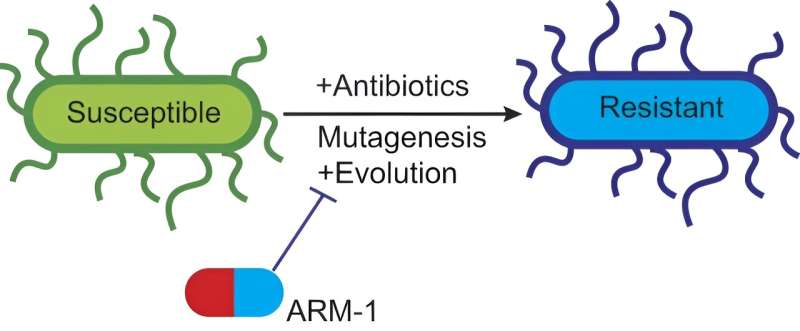This article has been reviewed according to Science X's editorial process and policies. Editors have highlighted the following attributes while ensuring the content's credibility:
fact-checked
trusted source
proofread
Biochemists discover compound that inhibits evolution of antibiotic resistance

Vanderbilt scientist Houra Merrikh led a team of researchers who discovered the first anti-evolution chemical compound that prevents drug resistance development in bacteria. The compound is also a drug development platform that targets antimicrobial resistance during treatment of infections with antibiotics and evolution in general, Merrikh said.
The article, "A small molecule that inhibits the evolution of antibiotic resistance," was published in the journal NAR Molecular Medicine in January.
The World Health Organization ranks AMR in both human and animal populations as one of the top 10 global health risks, according to United Nations report. By the year 2050, as many as 10 million lives could be lost every year to this issue, potentially devastating economies and severely disrupting agricultural output.
AMR develops when bacteria, viruses, parasites, or fungi become unaffected by antimicrobial treatments that had previously worked. Earlier research by the Vanderbilt team showed that DNA translocase Mfd—a protein responsible for moving molecules across cell membranes—causes genetic mutations and speeds up the development of AMR.
In this study the biochemists, including Research Assistant Professor of Chemistry Kwangho Kim, and Professor of Biochemistry Martin Egli, used a high-throughput screen of living cells to discover a small molecule that inhibits mutations caused by Mfd. In addition to diminishing genetic mutations, the molecule named ARM-1 slows the development of antibiotic resistance across a broad spectrum of bacterial pathogens.
These findings suggest that combining a to-be-developed drug that inhibits Mfd with traditional antibiotics is a promising strategy to prevent the progression of antibiotic resistance during the clinical treatment of infectious diseases.
Following this study, the team will be optimizing ARM-1 for clinical translation. "Our goal is to move the identified compound into medicinal chemistry and develop a clinically effective drug," said Merrikh, who is also a member of the Vanderbilt Institute for Chemical Biology. "We will focus on difficult-to-treat infections like cystic fibrosis, urinary tract infections, and tuberculosis infections."
More information: Juan Carvajal-Garcia et al, A small molecule that inhibits the evolution of antibiotic resistance, NAR Molecular Medicine (2024). DOI: 10.1093/narmme/ugae001
Provided by Vanderbilt University





















